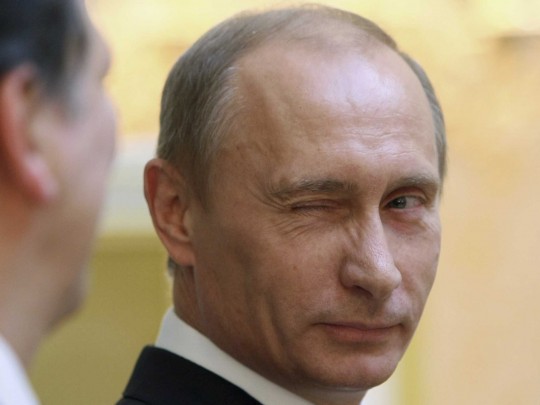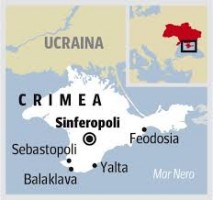

The Increased Strategic Importance of the Black Sea in the Wake of the Ukrainian Crisis.1.

Putin, lo ‘zar’ delle ‘Russie’.
Il primo di una serie di articoli di approfondimento sulla importanza attuale del Mar Nero e della Crimea del dott. Gregorio Baggiani (nuovo collaboratore di OA), esperto del settore strategico di cui scrive, Osservatore elettorale OSCE e consulente MAE per lo spazio postsovietico. Avremo così un approfondimento sul mondo post sovietico e sulla attuale politica russa nel Mar Nero, contestualizzando la crisi Ucraina. Questa serie di articoli, speriamo, riesca a illustrare meglio quali forze economiche e politiche si muovono in quella zona da noi lontana ma che ha una influenza diretta sulla politica europea. Come è abitudine di OA, tutte le opinioni scientifiche sono analizzate, anche contrastanti tra loro perché una pluralità di voci rappresenta la vera democrazia del pensiero.Un benvenuto al dott. Baggiani.
Il Direttore scientifico: Maria Gabriella Pasqualini
(Nei prossimi giorni la traduzione in italiano)
1.1 The increased strategic importance of Crimea
Russia is constantly reinforcing its military bases in Crimea (1), with the use of “Bastion” anti-ship missiles. This indicates preparation for a large-scale military conflict, presumably against Ukraine, or at least, for an increased domination in the Black Sea and against foreign ships (2).
The basic idea behind Russia’s occupation of Crimea’s is to “promote” Russian exports even through military dominance in the Black Sea, to Ukraine’s commercial and economic detriment, and above all to counter NATO’s predominance there, which Russia sees as an outright existential threat to its positive economic and geopolitical development, not to mention to its the security. Crimea today represents Russia’s most important outpost for the control of the Black Sea and therefore of the energy resources that run through it from the Caspian Sea. Other aspects of the economy, such as agriculture, electricity production and so on are also being reinforced, though with a great financial strain by Russia. This will bring about excessive pressure on the budget of the Russian Federation and in the long run also lead to political tensions in the country, due to overspending, which in turn will necessarily lead to reductions in social expenditure and hence to a dangerous decrease of popularity for Vladimir Putin.
Military and infrastructure expenditures are now exceeding social spending, something that cannot last too long in Russian politics. The political pact between leader and population has come to a crossroads. The only “solution” for the Russian leadership is to obtain clear-cut and economically profitable foreign policy victories, be it in the political or military field. This would further reinforce Russian nationalism against the “image of the enemy,” represented by the West and especially the United States, which is, as we know, an excellent tool to reinforce consensus and nationalism at home and divert the population’s attention from internal problems.
As we know, anti-Americanism is one of the most important and resilient foreign policy tools to gather the population around its leader. Crimea is therefore the indispensable tool to achieve the military results that would lead to important strategic goals, such as the control and subjugation of the Black Sea, which like the Persian Gulf or the Suez Canal, is one of the most important routes in the world for trade in general and the energy trade in particular. This control would allow Russia to continue selling energy resources to Europe, despite the almost complete loss of its pipeline infrastructures that ran through Ukrainian territory until recently and now need to run through the Eastern Black Sea and Turkish territory. This is an absolute pivotal move if Putin wants to safeguard Russian gas exports to Europe while assuring his approval ratings in Russia. Russian autocrats fear unpopularity more than they do a limited and winnable war like the present conflict in Ukraine.
1.2. The role of Crimea as an outpost of Russian air and sea power
Crimea, both as an “air carrier” in the Black Sea and an energy hub allowing self-sufficiency, is one of the important elements that could help Vladimir Putin retain his power in the years to come. Crimea’s shallow seabed, which allows important savings on energy infrastructures (3) for the transit of energy resources through the Eastern Black Sea and, as already mentioned, through the Black Sea, could prove to be a very important factor for Putin’s successful tenure in the next years. From the Russian point of view, the continuing infighting in Eastern and South Eastern Ukraine is, along with other important strategic issues, partially due to the need to build a land and sea corridor through the Ukrainian city port of Mariupol towards recently annexed Crimea and to paralyze the functioning of a viable Ukrainian state.
Furthermore, the strong militarization of Crimea will bring about the full control, not only of the Black Sea, but of Ukraine too (4). A political and non-military consideration should be made here: it is unlikely that the West would risk a full-fledged military conflict with Russia for the sake of Ukraine (5) for fear of a serious, and above all nuclear, extension of the military conflict with Russia. Unless Ukraine, after the recent relinquishment of its bloc-free status, were to become a NATO member in the near future, something that would make the possibility of a war with Russia more likely, as Ukraine and Russia would most probably be at odds over the issue for the years to come. NATO, however, would probably be forced to intervene, should there be a serious threat or outright blackmail posed by Russia to energy transport running through the Black Sea from the Caspian
1.3 Possible political and military answers to Russia’s defiance in the Black Sea over Crimea
The question is therefore how NATO should respond politically and militarily to this Russian energy defiance in the Black Sea and especially to the issue of a Crimean peninsula turning rapidly into an impenetrable nuclear fortress (6). One of the main political issues NATO will have to confront in this scenario of confrontation is how to respond to Russia’s aggressions, undertaken in forms not contemplated by NATO or by classic warfare schemes. In the Ukrainian crisis we have not witnessed outright direct military aggressions, but a “Hybrid war,” (7) a new kind of war (8) based on a mix of “disguised” military power, propaganda, ideology and the involvement of local, dissatisfied minorities – in the same way as in Crimea and partially in the Donbass and Georgia. It is also true, however, that the Crimean Tatars, a Turkic ethnic group that would obtain increased protection by Turkey, along with the Ukrainian minorities who remained in Crimea after its conquest by Russia, would not necessarily swear allegiance to Russia in case of a conflict with NATO military forces, even though they would be strictly monitored by the Russian authorities in Crimea, who keep the pressure high on these groups and tend to harass them, keeping them in a position of legal and psychological inferiority. Indeed, this harassment by Russian authorities of the Crimean Tatars will lead to a deterioration of Russian-Turkish relations in the near future.
Putting aside these purely political considerations, from a strictly military point of view, the fact that Crimea has been transformed into a Russian military fortress makes the possibility of a conflict with NATO more likely, even though not in the immediate future. However, the fact that Crimea is now de facto Russian territory, though not officially recognized as such by the international community, implies that Russia could potentially engage with its regular troops stationed in Crimea in an official war with NATO troops or navies in the Black Sea area. Whether this will happen or not remains to be seen. Putin is usually more interested in geopolitical gains through economic pressure, ideological means or localized wars according to a scheme that calculates benefits and losses. His intention is most probably not to become entangled in a major war that he deems highly risky from the military point of view for Russia, for himself and for the Russian elite. However, cultural and irrational factors (a show of manliness and power, patriotic pride, the greatness of Russia, anti-Americanism as a political factor or “image of the enemy” etc.) or, above all, any serious military incidents between US and Russia, could tip the balance towards a major war. Such an event would have unforeseeable and grievous consequences for the entire Black Sea area and for Europe in general, being the area nearest to it.
Other areas too, such as the Caspian Sea and the Middle East, would feel severe shockwaves from a hypothetical Russia-NATO conflict in the Black Sea, bringing about a serious crisis in energy transport through it towards the European markets and therefore to a severe crisis in international trade and energy markets. All this would lead to a prolonged economic international crisis threatening global stability. Of particular concern is Russia’s potential for “choking” nations like Ukraine. The latter, after losing Crimea to Russia, has a limited access to the Black Sea – which may be reduced to no access in the near future, if Russia chose to turn Ukraine into a landlocked rump state and antagonist of the former Slavic sister Russia, creating a continuous state of tension between the two States over territorial or energy conflicts. Conflicts that may force NATO to intervene, especially if, as already mentioned, Ukraine should in the future become a full-fledged member of NATO, an eventuality that the latter must obviously assess carefully but the implementation of which is steadily progressing, at least in the progressive readjustment of Ukrainian military forces to a NATO standard. For the West, one solution to avoid a direct military conflict with Russia could ultimately be to substantially help and support Ukraine in overcoming its difficulties and continuing its arduous process of State and nation building, which in the medium to long term would be more effective than supplying the country with weapons.
This because Russia tends generally to attack weak, unstable states in its vicinity, which represent lower risks of involvement in conflicts with major powers. Successful reforms could turn Ukraine into a strong and cohesive state. President Putin may receive advice from his closest advisers and colleagues on measures to adopt, but will ultimately take his own decisions, based on his ideas and perceptions. In the case of Ukraine and the Black Sea, the paramount goal for the Russian elite is security, in its military and political dimension. In other words, its aim is to preserve an autocratic regime that is constantly tightening up its screw on the civil liberties of its citizens on the background of a severe foreign policy crisis with the West and above all what the Russian elites (9) perceive as a potential military threat stemming from NATO.
Given the choice, Russian leaders prefer to operate to safeguard the military security of the country and retain its political structure and anti-Western ideological course rather than concentrate on the economic aspects of national security and on long due economic and political reforms. If this translates into an arms race, the potential military confrontation with the West will become more likely. An economic ruin of Russia due to an arms race will also become more and more apparent, (10) in spite of the fact that arms races are generally perceived by Russian political and military elites as an effective means of retaining a substantial “equality of rights” (ravnopravie) with the main powers on the international arena, especially when sanctions and low oil prices are taking a heavy toll on Russia’s struggling economy.
(3) http://www.ilsole24ore.com/art/finanza-e-mercati/2014-03-17/gasdotti-la-crimea-russi-sconto-10-miliardi-south-stream-153113.shtml?uuid=ABiA4d3&fromSearch (4 (4)http://ru.krymr.com/content/article/26888602.html “NATO general: Russia steps up its military presence in Crimea”
(5) http://vesti-ukr.com/blogs/voloshin/430-oruzhie-i-dominirovanie “Weapon and dominance”
(6) http://mw.ua/UKRAINE/russia-transforms-crimea-to-military-base-no-response-from-ukraine-242_.html
(8) http://gazeta.zn.ua/internal/gibridnaya-voyna-kak-klyuchevoy-instrument-rossiyskoy-geostrategii-revansha-_.html “The internal hybrid war as a key element of the Russian geostrategic revanche”
(9) http://carnegie.ru/2015/11/10/ru-61925/ildv “The mood of the Russian elites after Crimea”.
(10) http://www.the-american-interest.com/2015/12/14/deadlock/
www.osservatorioanalitico.com – Riproduzione riservata



Commenti recenti